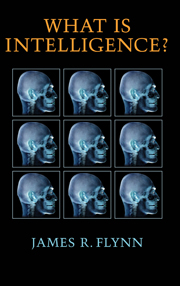Book contents
- Frontmatter
- Contents
- List of figures
- List of tables
- List of boxes
- Preface to the expanded paperback edition
- Acknowledgments
- 1 A bombshell in a letter box
- 2 Beyond the Flynn effect
- 3 Towards a new theory of intelligence
- 4 Testing the Dickens/Flynn model
- 5 Why did it take so long?
- 6 IQ gains can kill
- 7 What if the gains are over?
- 8 Knowing our ancestors
- 9 The art of writing cognitive history
- 10 About GUT: the grand unification theory of intelligence
- 11 Howard Gardner and the use of words
- Appendix I Tables
- Appendix II Declaration in a capital case
- References
- Subject index
- Name index
9 - The art of writing cognitive history
Published online by Cambridge University Press: 05 August 2012
- Frontmatter
- Contents
- List of figures
- List of tables
- List of boxes
- Preface to the expanded paperback edition
- Acknowledgments
- 1 A bombshell in a letter box
- 2 Beyond the Flynn effect
- 3 Towards a new theory of intelligence
- 4 Testing the Dickens/Flynn model
- 5 Why did it take so long?
- 6 IQ gains can kill
- 7 What if the gains are over?
- 8 Knowing our ancestors
- 9 The art of writing cognitive history
- 10 About GUT: the grand unification theory of intelligence
- 11 Howard Gardner and the use of words
- Appendix I Tables
- Appendix II Declaration in a capital case
- References
- Subject index
- Name index
Summary
As the preface says, the publication of this paperback edition affords an opportunity to expand on some themes and, most important, to clarify what kind of book this is. I am not the first to try to write a history of cognition. Oesterdiekhoff has written about the transition from the minds of pre-industrial peoples to the modern mind. He has also just translated one of his seminal works so that for the first time, English-speaking scholars can appreciate his Piagetian interpretation of IQ gains since the industrial revolution (Oesterdiekhoff, 2008).
However, as far as I know, this book is the first attempt to write the cognitive history of a particular nation in the twentieth century based on a detailed analysis of differential trends on a variety of IQ tests and subtests. One could write a cognitive history based solely on the effects of formal education, the rise of a visual culture, and so forth. But lacking IQ data, such a book might miss certain features that set our minds off from those of our ancestors. And because we have the IQ data, paradoxes emerged that called out for resolution. On the other hand, the fact that trends on IQ tests were the artifacts that, at least initially, set my task as a historian was a mixed blessing. IQ tests are instruments of measurement. Therefore, they create an unusual barrier between my book and psychometricians.
- Type
- Chapter
- Information
- What Is Intelligence?Beyond the Flynn Effect, pp. 178 - 196Publisher: Cambridge University PressPrint publication year: 2007



